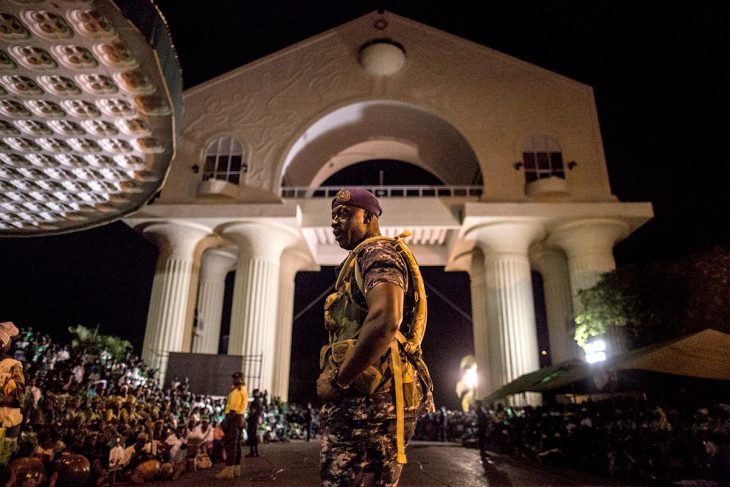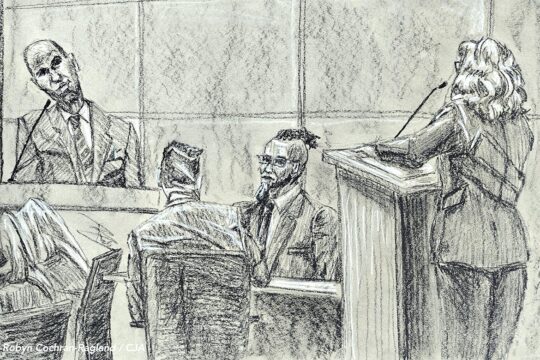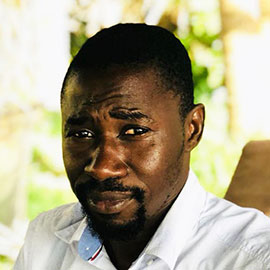At the entrance to Gambia’s capital, Banjul, is a monument designed as a memorial to the July 22, 1994, military takeover by Yahya Jammeh. The imposing three-floor structure — 42 metres high and 30 metres wide — was built between 1995 and 1996, costing taxpayers US$1 million. It was erected on a burial site of dead British colonial officers, whose remains were moved to Jeshwang, some 10 minutes’ drive from Banjul. In 2000, the Arch – widely called “Arch 22” – was made a national monument. It has a large flower bed a few metres away, at the centre of which stood a statue known in Gambia as the “unknown soldier” — a man holding a baby in the right hand, with an AK47 assault rifle on his back and two fingers of the left hand in the air. The ersatz bronze statue symbolized the supposed ‘soldiers with a difference’, a label the Junta was given in the early days of the “revolution”.
The ‘unknown soldier’ was removed by a group of civilian vigilantes after the fall of Jammeh in January 2017 and has since been relocated to the country’s national museum in Banjul.
According to a recent investigation into Jammeh’s financial dealings, the contract to build the Arch was single-sourced to a “close associate” of the former dictator, Amadou Samba. But the monument paying tribute to the coup still sits overlooking the country’s Supreme and High Courts which are cut off from the Justice Ministry by a road leading to the State House, the seat of the presidency.
“A suitable place to memorialize anything”
In late June, the Arch made headlines as the centre of a dispute between the Truth, Reconciliation and Reparations Commission (TRRC) and the Ministry of Justice. It started with an eight-page memorandum of understanding, dated 24 May, between the National Centre for Arts and Culture (NCAC), the institution responsible for the Arch maintenance, and the TRRC, aimed at renaming the monument to a “Memorial Arch”. “A plaque will be erected and the names of all persons who died as a result of human rights violations and abuses committed by state agents or their sponsors during the Jammeh era will be inscribed on the plaque,” states the memorandum. “The names of the victims can be carved in wood, clay, stone or metal within the Arch 22 space to become like a Memorial Wall.” Among other things planned at the monument are photo exhibitions of Jammeh era victims and relics of torture artefacts put on display, including a recreation of “Banba Dinka”, a holding cell at the National Intelligence Agency, located right next to the Arch, where prisoners were tortured.
Gambia’s leading historian Hassoum Ceesay is the managing director of the NCAC. “Thousands visit the Arch, among them students and tourists. The Arch is a very suitable place to memorialize anything,” he told Justice Info. Indeed, the Arch already exhibits pictures both celebrating Jammeh’s rule and depicting its human rights violations. “The Memorial will add value in terms of increasing visits by the public. They [The Commission] were also supposed to give the Arch a facelift,” said Ceesay.
Justice Ministry pushes back
As the Truth Commission made first preparations to start the project, local newspapers broke the story. Jammeh’s supporters saturated social media sites expressing anger at what they considered an attempt to erase Jammeh’s legacy. But they were not the only ones. Known supporters of President Barrow, whose party has been criticized for flirting with Jammeh’s support base, have equally opposed the idea. A youth leader in Barrow’s party, Sanusey Taal, said on his Facebook page that the “renaming of the Arch is a political suicide” for his party and the president because it would anger the APRC, Jammeh’s party, whose votes he is trying to get.
However,the official story claims not to be about politics. Minister of Justice Dawda Jallow, under whose purview the TRRC falls, said the government was not informed of the decision. “We were not in the picture. So, I had to call them [the TRRC] and say that the ministry should not be unaware of renaming a major national asset like that. There are laid down rules for this, which include going to cabinet to seek approval,” Jallow told local media on June 23. He added that the Commission could include the proposal in the recommendations of its final report, which it is expected to submit to the President on July 12.
The TRRC disagreed. It claims its Act gives it powers to grant reparations and that the move to rename the Arch was part of its memorialization programme, a form of reparations granted by truth commissions. It also denied having left the authorities in the dark. “We have informed our line ministry — Justice — and also the Ministry of Tourism. An aide-memoire was written to them all,” Essa Jallow, the communications director of the TRRC, told Justice Info. “So, if the information did not get to [President] Barrow, that would not be our problem because we do not directly correspond with the President.”
Political expediency?
The government’s rejection of the plans to rename the Arch has aroused additional controversies. For some activists, it is a warning shot foretelling how political expediency will affect the implementation of the Truth Commission’s recommendations.
Human rights defender Madi Jobarteh believes the TRRC should have had an extensive consultation on the issue, including meeting the President. “However, if the government was also interested and committed to this issue, nothing stops them from intervening way earlier, just to make sure the right process is taken,” he said. “Now that the government only said ‘hold on’, we are yet to hear or see any effort in pursuing the matter further. Rather, we heard from many sources about the rapprochement between the NPP [President Barrow’s party] and the APRC, thus validating concerns that indeed it was due to political expediency that the government put a stop to it.”
For Gambian researcher and academic Sait Matty Jaw, “what is appropriate not to further deepen political polarization is for the TRRC to recommend and the government to implement”.
TRRC’s credibility challenged
The political intrigue is further fed by rumours about the presidential ambitions of two major players at the TRRC: the Commission’s executive secretary Dr. Baba Galleh Jallow and its lead counsel Essa Faal. Jallow said in June that he had seriously considered running for the presidency as an independent candidate but that he has changed his mind due to certain unspecified constraints. Faal hasn’t publicly spoken about the issue.
Though the Commission’s report is to be approved by all the commissioners, the two play a significant function in its drafting. Critics said their decision on running for president could affect how the Commission is seen. “Given their role in one of the most transformative institutions established to help address past injustice impartially, for them to come and contest will undoubtedly draw concerns,” said Jaw. “And I think I am equally concerned as to how their interest, particularly Faal's interest, will inform the outcome of the TRRC. Already his critics are pointing to the fact that he has used the TRRC as a launchpad for his politics. Whether true or not, it’s dividing public opinion and contributing to further polarization. Perhaps Fall’s win [would] help implement the TRRC recommendations but him losing and the politics around him might make it difficult for any government to implement the recommendations. His department might have a significant hand in the drafting of the TRRC report and that may also raise partiality concerns. It’s a difficult question.”
TRRC executive secretary Dr. Jallow disagrees. “I think that most of these critics are not entirely innocent or disinterested in who is running or not running for president because they support other parties and candidates,” he said. “Moreover, how exactly is the state or APRC supposed to politicize the commission’s recommendations beyond what they have already done? Has the APRC not consistently called the commission’s work a political witch hunt against Jammeh? Have they not always alleged that witnesses are bribed to testify against Jammeh? Have they not insisted that Jammeh has never committed a single human rights violation? As for the state, is it not a well-known fact that Barrow has been courting the APRC for more than a year now? Is it not a known fact that the NPP and APRC are in talks and negotiations over forming a possible coalition in the December 2021 elections? If the NPP and APRC form a coalition, or even if Barrow is assured of votes from APRC supporters, we would not expect him to implement the recommendations of the commission when it comes to prosecuting those most responsible for human rights violations, which is to say Jammeh himself and some of his key lieutenants. So, to claim that our involvement in politics will lead to the politicization of the TRRC recommendations is a non-starter because both the state and the APRC have long been doing exactly that.”
For historian Ceesay, the saga over the Arch has come to overshadow what is a good project to preserve history. “The renaming should not distract us from the permanent exhibition and other things that would have added value to the Arch,” he said, expressing his disappointment at the turn of events.







